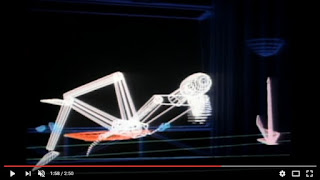Behind the scenes "Cans" TVC
The process got more elaborate in the 2000s with full body suits, balls and lines to pinpoint body parts and movement as actors interacted with skeletal set pieces.
Actors being filmed in mo-cap for Final Fantasy.
Completed still from Final Fantasy.
Masahiro Mori's Uncanny Valley TheoryMori's theory is that the closer a character or robot gets to looking like a real human, the greater the chance that a real human's empathic response to it will plummet into what he calls "The Uncanny Valley". In the chart above, a stick figure is at the lowest end of both the empathic response and realism scale while Mori, a real person, is at the highest end of both. As realism goes up, so does response but for characters like Tom Hank's Polar Express conductor, the viewer becomes "creeped out" because it is both realistic and completely fake at the same time. The trick is to keep just shy of the plunge as a successful replication of humans has never been made. Sex doll manufacturers certainly are trying their hardest and a breakthrough may yet be made in the future.
Westworld's treatment of android human "characters" in a western-theme park was very successful because they were played by actors and through some CGI and editing techniques were made slightly robotic without upsetting the viewer.








No comments:
Post a Comment